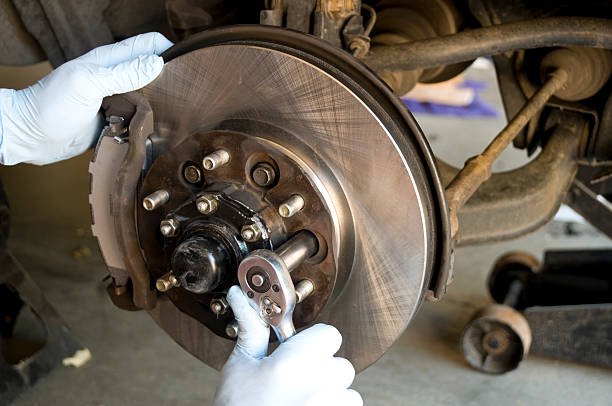Your vehicle’s braking system is one of its most critical components, ensuring your safety and that of others on the road. Routine maintenance and timely brake repairs are essential to avoid costly damages and accidents. At University Collision, we understand the importance of reliable braking systems and strive to provide top-notch repair services tailored to your needs.
In this article, we’ll explore the essentials of brake repair, common issues, warning signs, and why professional repair services matter.
Understanding the Basics of Brake Systems
A vehicle’s braking system is a complex assembly of parts working together to slow or stop the car. Major components include:
- Brake Pads and Rotors: Provide the friction needed to stop the wheels.
- Brake Calipers: House the brake pads and press them against the rotors.
- Brake Fluid: Transfers hydraulic pressure to the brakes.
- Drum Brakes (in some vehicles): Alternative to disc brakes for rear wheels.
Regular inspection of these components ensures smooth functionality.
Signs Your Brakes Need Repairs
Ignoring early warning signs of brake issues can lead to severe damage. Look out for:
- Squealing or Grinding Noises: Indicates worn-out brake pads.
- Vibrations While Braking: Suggests warped rotors.
- Soft or Spongy Brake Pedal: May signal air in the brake lines or a fluid leak.
- Dashboard Warning Light: Alerts of potential system faults.
Addressing these signs promptly can save you from costly repairs down the road.
Common Brake Problems and Their Causes
Here are some frequent brake issues and their underlying causes:
- Worn Brake Pads: Result of normal wear and tear.
- Leaking Brake Fluid: Often caused by damaged hoses or seals.
- Overheated Rotors: Due to excessive braking or driving in hilly areas.
- Sticking Calipers: Caused by rust or debris buildup.
Each issue requires a specific repair approach to restore optimal performance.
Importance of Regular Brake Inspections
Routine brake inspections are crucial for maintaining safety and prolonging the system’s lifespan. Professionals check for:
- Thickness of brake pads.
- Condition of rotors and calipers.
- Proper brake fluid levels and quality.
It’s recommended to have your brakes inspected every 12,000 miles or once a year, depending on your driving habits.
DIY vs. Professional Brake Repair
While some brake issues can be tackled with basic tools, others require professional expertise:
- DIY Repairs: Suitable for replacing brake pads or bleeding brake lines if you have the skills.
- Professional Repairs: Best for diagnosing and fixing complex issues, such as caliper replacements or brake system overhauls.
Professional services ensure accuracy and safety standards are met.
Benefits of Timely Brake Repairs
Delaying brake repairs can lead to:
- Increased stopping distance.
- Damage to other components like rotors and calipers.
- Higher repair costs.
Timely repairs improve your vehicle’s safety and save money in the long run.
Choosing the Right Brake Repair Service
Selecting a trustworthy service provider ensures your vehicle is in capable hands. Look for:
- Certified technicians with experience in brake systems.
- Transparent pricing and detailed repair estimates.
- Positive customer reviews and testimonials.
A reliable service provider prioritizes your safety and satisfaction.
Preventive Maintenance Tips for Brakes
Extend the life of your brakes with these maintenance tips:
- Avoid aggressive or sudden braking.
- Regularly check and replace brake fluid.
- Monitor brake pad thickness.
- Drive within speed limits to reduce wear.
Preventive care minimizes the risk of unexpected brake failures.
FAQs
Q1: How often should I replace my brake pads?
Brake pads typically last 30,000 to 70,000 miles. However, driving habits and road conditions can affect their lifespan.
Q2: Can I drive with squeaky brakes?
It’s not advisable. Squeaky brakes often indicate worn pads or other issues that need immediate attention.
Q3: What happens if I ignore a brake fluid leak?
Ignoring a leak can lead to a complete brake failure, compromising your safety. Address it immediately.
Q4: Why does my car pull to one side when braking?
This usually occurs due to uneven brake pad wear or a stuck caliper. A professional inspection is necessary.
Q5: Is it safe to replace only one set of brake pads?
It’s recommended to replace pads on both wheels of the same axle to ensure balanced braking.
Conclusion
Maintaining a healthy braking system is vital for your safety and vehicle performance. Whether you’re dealing with worn pads, fluid leaks, or unusual noises, addressing brake issues promptly ensures peace of mind on the road. Trust experienced professionals to handle your brake repair needs with precision and care.
By following the tips outlined here, you can keep your vehicle’s brakes in top condition and avoid unexpected issues. Stay safe and drive confidently knowing your braking system is reliable.
